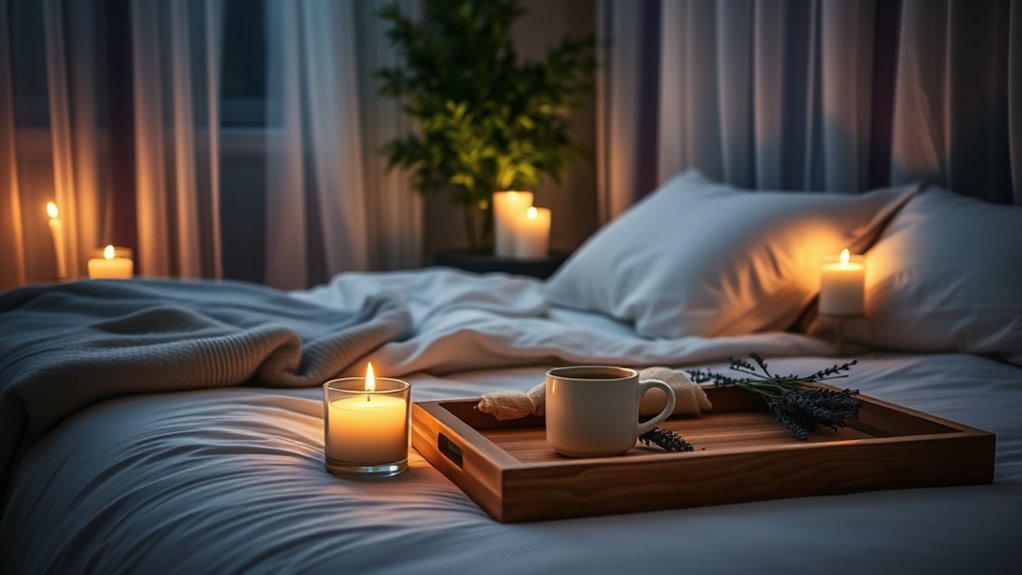How to Create a Natural Nighttime Relaxation Ritual
Imagine a world where the stresses of the day simply melt away as night falls. Creating a natural nighttime relaxation ritual can transform your evenings into a sanctuary of peace. By establishing a soothing routine filled with calming practices, you can enhance your sleep quality and overall well-being. Discover how to set the perfect atmosphere, incorporate mindfulness, and engage in gentle movements that promote tranquility. Your journey to restful nights starts here.
Understand the Importance of a Nighttime Routine
Why is a nighttime routine so crucial for your overall well-being?
Establishing nighttime relaxation rituals helps signal your body that it’s time to unwind. When you create a consistent routine, you encourage better sleep quality, reduce stress, and enhance your mood. Engaging in calming activities, like reading or gentle stretching, prepares your mind and body for rest. By prioritizing these rituals, you’re not just winding down; you’re investing in your health. Incorporating soothing herbal rituals can further enhance your relaxation and promote a deeper sleep experience. Over time, a soothing nighttime routine can transform your evenings into a sanctuary of relaxation, allowing you to recharge and face each new day with renewed energy and clarity.
Create a Calming Atmosphere
Transform your space into a soothing retreat by dimming the lights and adding calming scents.
Use soft lighting, like lamps or candles, to create a warm glow.
Consider essential oils such as lavender or chamomile, which can help promote relaxation.
You might also play gentle music or nature sounds to enhance the tranquil atmosphere.
Clear away clutter to foster a sense of peace, and arrange comfortable seating or cushions where you can unwind.
Finally, consider adding plants or soft textiles to bring in a touch of nature, making your environment feel more inviting and serene. Additionally, incorporating effective aromatherapy tips can further enhance your relaxation experience.
Incorporate Mindfulness Practices
How can you seamlessly integrate mindfulness into your nighttime routine?
Start by setting aside a few minutes to engage in deep breathing. Inhale slowly through your nose, hold for a moment, then exhale gently through your mouth. This simple practice calms your mind and body.
Next, try a short body scan meditation, focusing on each part of your body and releasing tension. You might also journal your thoughts, reflecting on the day’s highlights and expressing gratitude. Incorporating mindfulness practices into your evening routine can significantly enhance relaxation.
Finally, consider gentle stretching to connect your mind and body, preparing you for a restful night. Embrace these practices to foster tranquility before sleep.
Utilize Aromatherapy for Relaxation
As you wind down for the evening, incorporating aromatherapy can significantly enhance your relaxation routine. Essential oils can create a calming atmosphere, making it easier to unwind. Consider using a diffuser with soothing scents like lavender, chamomile, or sandalwood. Additionally, using essential oils as part of your nighttime ritual can promote better sleep and improve overall well-being.
| Essential Oil | Benefits | How to Use |
|---|---|---|
| Lavender | Promotes relaxation | Diffuse or apply topically |
| Chamomile | Reduces anxiety | Add to bath or diffuse |
| Sandalwood | Enhances mood and clarity | Use in meditation rituals |
Engage in Gentle Stretches or Yoga
After enjoying the calming effects of aromatherapy, consider incorporating gentle stretches or yoga into your nighttime routine. These practices help release tension, improve flexibility, and prepare your mind for restful sleep.
Start with simple poses like Child’s Pose or Cat-Cow to ease your body. Focus on your breath, inhaling deeply and exhaling slowly to enhance relaxation.
Spend about 10-15 minutes on these stretches, allowing your thoughts to drift away. You’ll find that this mindful movement not only calms your body but also soothes your mind, making it easier to transition into a peaceful night’s sleep. Additionally, engaging in relaxation techniques such as these has been shown to significantly improve sleep quality.





